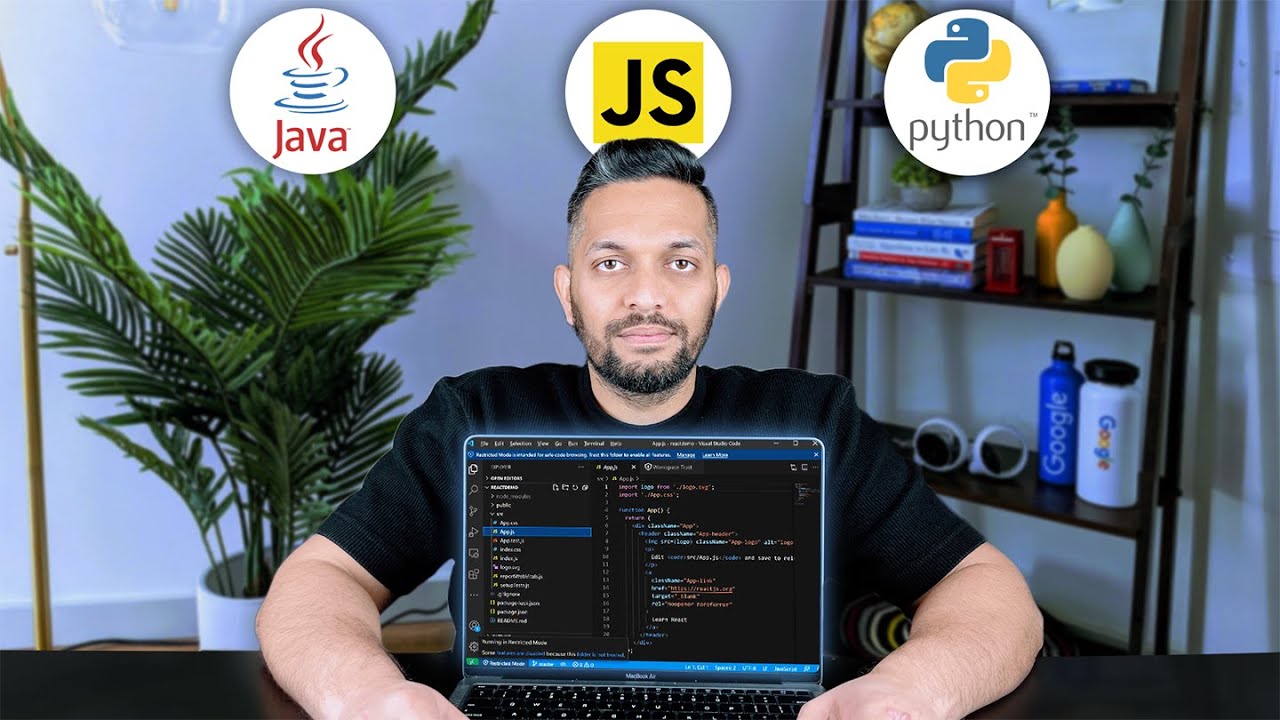How to Learn Javascript in 2023 (From ZERO)
Summary
TLDRThis video offers a comprehensive guide for beginners to learn JavaScript effectively, based on the speaker's eight years of experience as a software developer. It covers the essentials of starting from scratch, including understanding syntax, data types, and problem-solving. The speaker emphasizes the importance of structured learning, dedicating at least 15 hours a week to practice. The script also provides a structured approach to skill progression through building projects of increasing complexity and solving programming challenges on platforms like edibit.com. Finally, it touches on job hunting strategies, including creating a portfolio website and preparing for technical interviews.
Takeaways
- 🚀 Start with the basics: Begin learning JavaScript by understanding the fundamentals such as syntax, data types, variables, operators, functions, and problem-solving skills.
- 🎼 Learn like playing an instrument: Just as with music, spend time learning the theory before jumping into complex projects.
- 📚 Choose quality learning resources: Find a high-quality learning resource, such as a book or online course, and stick to it until completion.
- 🔍 Research and select wisely: Spend time researching the best learning resources and pick one that is consistently recommended and has good reviews.
- 📅 Create a structured study schedule: Establish a routine and stick to it for effective learning.
- 🏠 Find a dedicated study space: Ensure your study environment is free from distractions and interruptions.
- 📱 Minimize digital distractions: Put your phone on airplane mode to avoid the temptation of social media and other apps.
- ⏳ Commit to a minimum study time: Aim for at least 15 hours of study per week to see progress in rewiring your brain for programming.
- 🛠 Engage in 'real practice': After learning the basics, start building projects to apply your knowledge and improve your skills.
- 🏗️ Build a progression of projects: Start with easy projects like a to-do app, then move to intermediate projects using a modern JavaScript framework, and finally tackle a complex project.
- 📈 Utilize online platforms for practice: Use websites like edibit.com to solve programming challenges and improve specific JavaScript skills.
- 📈 Embrace the plateau: Understand that progress in learning is not linear and will involve periods of seeming stagnation.
- 💼 Prepare for job applications: Create a portfolio website, update your LinkedIn profile, apply to jobs, and prepare for technical interviews to land a job in JavaScript development.
- 🌐 Consider joining a mentorship program: For self-taught developers, joining a mentorship program can provide additional support and guidance in landing a job.
Q & A
What is the recommended approach to start learning JavaScript according to the video?
-The recommended approach is to start with the basics, similar to learning a musical instrument, by understanding syntax, data types, variables, operators, functions, methods, control flow, and problem-solving.
Why is it important to learn the fundamentals of JavaScript before moving on to more complex projects?
-Learning the fundamentals ensures that the basics are well understood, making it easier and quicker to apply these skills in building real projects later on.
What does the video suggest as a good strategy for selecting a learning resource for JavaScript?
-The video suggests researching on platforms like Reddit, Google, and Twitter to find highly recommended books or online courses, and then choosing one to follow through to completion.
How does the video recommend structuring your study time for learning JavaScript?
-The video recommends creating a reasonable schedule, dedicating a quiet study space, using noise-canceling headphones if necessary, and putting your phone on airplane mode to minimize distractions.
What is the minimum number of hours per week suggested for studying JavaScript to see progress?
-The video suggests studying for a minimum of 15 hours per week to effectively rewire your brain and learn JavaScript.
What are the three easy projects recommended for beginners to build as part of their real practice in JavaScript?
-The three easy projects recommended are a to-do app, a rock-paper-scissors game, and a random quote generator.
Why is it important to build projects of increasing difficulty after learning the basics of JavaScript?
-Building projects of increasing difficulty helps to apply theoretical knowledge, improve problem-solving skills, and demonstrate a track record of progressively challenging work.
What is the role of solving programming challenges in the learning process as mentioned in the video?
-Solving programming challenges is a form of 'drills' that helps to improve specific parts of your programming skills, similar to how athletes practice specific moves.
What website does the video recommend for beginners to practice JavaScript through programming challenges?
-The video recommends edabit.com for beginners to practice JavaScript challenges, as it allows choosing different skill levels and specific skills to work on.
How does the video suggest applying the skills learned in JavaScript to land a job?
-The video suggests creating a portfolio website, updating your LinkedIn profile, applying to jobs that match your experience level, and preparing for technical interviews to increase the chances of getting hired.
Outlines

This section is available to paid users only. Please upgrade to access this part.
Upgrade NowMindmap

This section is available to paid users only. Please upgrade to access this part.
Upgrade NowKeywords

This section is available to paid users only. Please upgrade to access this part.
Upgrade NowHighlights

This section is available to paid users only. Please upgrade to access this part.
Upgrade NowTranscripts

This section is available to paid users only. Please upgrade to access this part.
Upgrade NowBrowse More Related Video

JavaScript ROADMAP 2024: How to Become a JavaScript Developer and Get a Job (Step-by-Step Guide)

How To Start Trading Stocks As A Complete Beginner

GSOC 2025 Complete Roadmap: Step by Step Guide

3 Developer Roadmaps That Actually Work

Tutorial Dasar Menggunakan Oracle SQLDeveloper (Bahasa Indonesia)

The Complete 2023 Web Development Bootcamp | 1- What You'll Get in This Course
5.0 / 5 (0 votes)